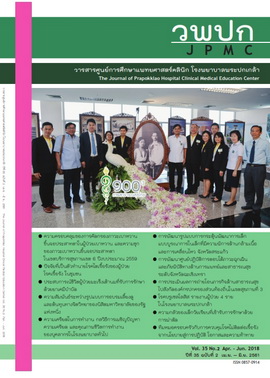The Fear of Surgical Treatments in School-Aged Children
Main Article Content
Abstract
School-aged children generally start having their individual perceptions. They are able to increasingly evaluate situations, and make their own judgments for some certain matters. They initially understand several events logically; however, they could easily cause fear of many things. When they are ill and admitted to hospital for treatment, they appear to be able to understand their illness and the treatment procedures. Surgical treatments are considered to be significant procedures, which are generally seen in school-aged children cases. However, if school-age children do not cooperate during the surgical procedure, it will consequently impact every step of the operation performance and medical care process. Thus, the main problem usually found is that school-aged children feared of being admitted to operations. The fear of operations of school-aged children is an emotional reaction toward a hazardous or threatening situation. This could lead to both positive and negative behavior to adjust and avoid themselves to minimize the effects of that threatening situation. Fears of school-aged children could naturally occur depending on their maturity and learning level, which usually changes based on their age, intellectual development, perception, experience, and environment.
This article therefore presents the guidelines for looking after school-aged children with fear of operations, which is expected to reduce the children’s fear related reactions and behavior. The study findings should lead to efficiency of care and become guidelines for nurses, which are important carers, who can help reduce the fear of school-aged children that are admitted to hospitals for operations.
Article Details
References
2. Price DL, Gwin JF. Implications of pediatric surgery. In: Gwin JF, Price DL. Pediatric nursing: an introductory text. 11th ed. Texas: Elsevier Inc; 2012. p.26-7.
3. Price DL, Gwin JF. The School-age child. In: Gwin JF, Price DL. Pediatric nursing: an introductory text. 11th ed. Texas: Elsevier Inc; 2012. p.161-95.
4. Kyle T, Carman S. Essentials of pediatric nursing. 2nd ed. USA: Lippincott Williams & Wilkins; 2013.
5. Price DL, Gwin JF. Fear of the child. In: Gwin JF, Price DL. Pediatric nursing: an introductory text. 11th ed. Texas: Elsevier Inc; 2012. p.418-9.
6. Kalar MU, Mustahsan SM, Ali M, Fatima K, Farooque K, Batool M, et al. Understanding fear in school children. International Journal of Collaborative Research on Internal Medicine & Public Health 2013; 5: 268-78.
7. Sirivunnabood P. Developmental Psychology Theories. 4th ed. Bangkok: Chulalongkorn University; 2008.
8. Suwanmanee W, Pongjaturawit Y, Chaimongkol N. Relationships between health perception and fear of surgery in school-age children. The Journal of Faculty of Nursing Burapha University 2011; 19(5): 73-85
9. Kliegman R, Stanton B, Geme JW, Schor NF, Behrman RE. Nelson textbook of Pediatrics. 20th.ed. Philadelphia: Elsevier; 2016.
10. Muris P. Normal and abnormal fear and anxiety in children and adolescents. San Diego: Saunders Elsevier; 2007.
11. Bellin MH, Osteen P, Heffernan C, Levy JM, Snyder-Vogel ME. Parent and health care professional perspectives on family-centered care for children with special health care needs: are we on the same page? Health Soc Work 2011; 36: 281-90.
12. Milosevic I, McCabe RE. Phobias: the psychology of irrational fear. Santa Barbara, Greenwood; 2015.
13. Guldberg H. Reclaiming childhood freedom and play in an age of fear. New York: Routledge; 2009.
14. Suphawirotloet S. Reactions of fear from dental treatments in 7-year-old children at Sirindhorn Hospital. Khon Kaen Medical Journal 2008; 32(4):98-106.
15. Khamenkanก K. Children’s thoughts and feelings during hospitalization: nursing management. Journal of Nursing Science & Health 2011; 34(3): 75-87.
16. Broome ME, Mobley T. The child medical fears scale. In: Strickland OL, Dilorio C, editor; Colleen Measurement of nursing Outcomes. 2nd.ed New York: Springer; 2003.
17. Chaiyawat W, Brown JK. Psychometric Properties of the Thai Versions of State-Trait Anxiety Inventory for Children and Child Medical Fear Scale. Research in Nursing & Health 2000, 23, 406-14.
18. Phancharoen Ch, Seksan P, Ngamphaiboon Ch. A communication skills manual for chronic care models. Bangkok: Center for Communication Skills Training, Division of Pediatrics, Chulalongkorn Hospital; 2009.

